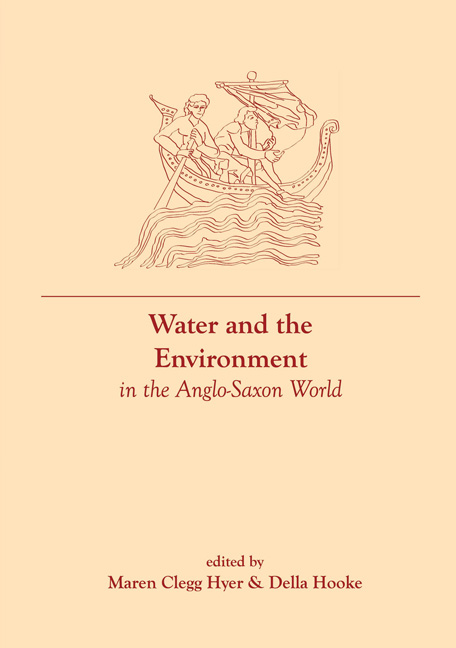Book contents
- Frontmatter
- Dedication
- Contents
- List of Illustrations
- List of Tables
- List of Contributors
- Introduction
- 1 From Whale's Road to Water under the Earth: Water in Anglo-Saxon Poetry
- 2 Water in the Landscape: Charters, Laws and Place Names
- 3 Fens and Frontiers
- 4 Marshlands and Other Wetlands
- 5 Rivers, Wells and Springs in Anglo-Saxon England: Water in Sacred and Mystical Contexts
- 6 Food from the Water: Fishing
- 7 Inland Waterways and Coastal Transport: Landing Places, Canals and Bridges
- 8 Watermills and Waterwheels
- 9 Water, Wics and Burhs
- Notes
- Suggested Reading
- Index
1 - From Whale's Road to Water under the Earth: Water in Anglo-Saxon Poetry
- Frontmatter
- Dedication
- Contents
- List of Illustrations
- List of Tables
- List of Contributors
- Introduction
- 1 From Whale's Road to Water under the Earth: Water in Anglo-Saxon Poetry
- 2 Water in the Landscape: Charters, Laws and Place Names
- 3 Fens and Frontiers
- 4 Marshlands and Other Wetlands
- 5 Rivers, Wells and Springs in Anglo-Saxon England: Water in Sacred and Mystical Contexts
- 6 Food from the Water: Fishing
- 7 Inland Waterways and Coastal Transport: Landing Places, Canals and Bridges
- 8 Watermills and Waterwheels
- 9 Water, Wics and Burhs
- Notes
- Suggested Reading
- Index
Summary
Dol bið se ðe gæð on deop wæter,
se ðe sund nafað ne gesegled scip
ne fugles flyht, ne he mid fotum ne mæg
grund geræcan; huru se Godes cunnað
full dyslice, Dryhtnes meahta
He who goes on deep water is foolish, he who does not have the skill to swim nor a sailed ship nor the flight of a bird, nor can he with his feet touch the ground; he certainly tests the power of God, the Lord, very foolishly.
Introduction
Almost any subject in Old English studies begins with Bede, and the subject of water is no exception. In the very first line of his Ecclesiastical History of the English People, Bede writes: ‘Britain, once called Albion, is an island of the ocean’. This womb-like image, suggesting that the island is birthed from the sea, defines Britain by virtue of its placement in water. As Bede continues his description, he establishes the importance of water to, its interconnectedness with, the nation's very existence. He seems to emphasize the bounty that the nation reaps from the seas and other sources of water, noting:
[Britain] is remarkable too for its rivers, which abound in fish, particularly salmon and eels, and for copious springs. Seals as well as dolphins are frequently captured and even whales; besides these there are various kinds of shellfish, among which are mussels, and enclosed in these there are often found excellent pearls of every colour, red and purple, violet and green, but mostly white. There is a great abundance of whelks, from which a scarlet-coloured dye is made, a most beautiful red which neither fades through the heat of the sun nor exposure to the rain; indeed the older it is the more beautiful it becomes. The land possesses salt springs and warm springs and from them flow rivers which supply hot baths, suitable for all ages and both sexes, in separate places and adapted to the needs of each.
- Type
- Chapter
- Information
- Water and the Environment in the Anglo-Saxon World , pp. 15 - 32Publisher: Liverpool University PressPrint publication year: 2017



